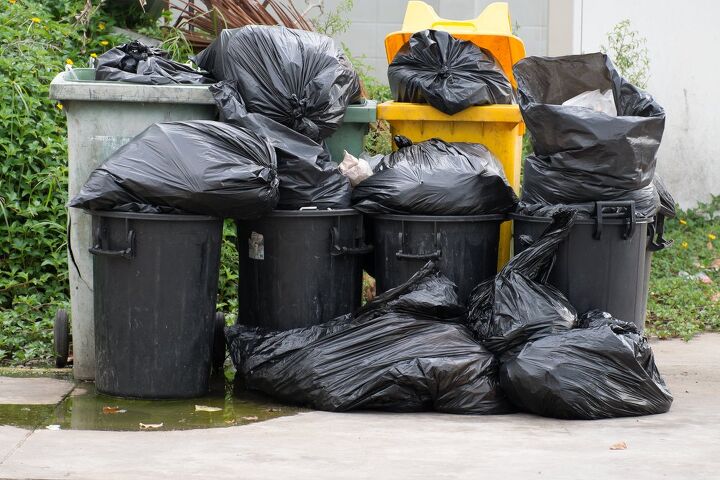Can a Landlord Charge For Garbage?

Garbage is a part of life. Even the most environmentally-conscious individuals produce garbage! It’s how one disposes of their garbage that’s important.
But what if you’ve just moved into a new apartment and there’s no waste or recycle bins when you get there? What if your landlord refuses to pay or arrange for garbage removal? Can a landlord charge their tenant for garbage removal?
These are the main questions this article answers. Remember that laws which regulate landlord-tenant relationships vary from state to state.
Yes and no. In some states this is allowed and in other states it’s not. In the states that do allow it, the landlord is not allowed to charge more than what they are charged to have the waste removed. Landlords in many places are also required to provide proper waste and recycle bins to their tenants.
Does a Landlord Have to Provide Waste & Recycle Bins?
In many states, landlords are supposed to provide waste and recycle bins for their tenants. The bins provided by the landlord should be in decent condition, and the number of bins a building receives should correspond with the number of tenants occupying the building. For example, a multifamily home will not be able to get by with just one waste and recycle bin.
Keep in mind that landlords aren’t required to provide waste and recycle bins in every state. In Alabama, Connecticut, Nebraska, and Oregon, landlords provide waste and recycle bins; in North Carolina, Delaware, and Arkansas they don’t.
Note: To see if your state requires that landlords provide waste and recycle bins, visit this link.
What to Do to Purchase Waste and Recycle Bins on Your Own
When you need to purchase waste and recycle bins for your property, it’s best to purchase these bins through your city or town. This way you’re much less likely to run into any problems.
If you purchase waste and recycle bins that are different from the ones your city or town uses, the waste removal service may not be able to collect them. Even though most bins now are designed for truck pickup, the waste management service will have to avoid picking up your bins if local policy prohibits residents from using a particular kind of bin.
Why Are Some Waste and Recycle Bins Prohibited?
Some waste and recycle bins are prohibited because they slow down the waste removal process. For example, if the bins you’re using have some kind of locking mechanism, then the waste removal service won’t be able to empty them quickly, and wasting time is something that can’t be done in the waste removal business.
And on the flip side, bins that can’t be properly secured are also prohibited, as these can easily be inhabited by rats, raccoons, and other rodents that forage through garbage. Moreover, the individuals who are removing waste don’t want to worry about live animals being in the bins they deal with.
Does a Landlord Have to Arrange for Garbage Removal?
Similar to how many states require landlords to provide waste and recycle bins, many states make garbage removal the landlord’s responsibility. Of course, landlords in these states don’t have to literally remove garbage on their own, rather they’re supposed to arrange waste removal, whether that be through a private waste removal service or through the local public waste removal service.
In Florida, a landlord is supposed to take care of garbage removal if their property is a multifamily home. On the other hand, those renting single-family homes are required to take care of garbage removal on their own.
Note: To see if landlords are required to arrange for garbage removal in your state, visit this link.
Can a Landlord Charge a Tenant for Garbage Removal?
Just because a landlord has arranged for garbage removal doesn’t mean their tenants won’t be asked to pay. Again, whether or not a landlord can charge their tenants for waste removal is a matter of state law. If the landlord does charge their tenants for waste removal, they cannot charge more than what it costs them.
Most landlords roll the cost of waste removal into their tenants’ monthly rent. Doing so is convenient for both the landlord and their tenants. If a landlord is found to be charging their tenants a higher rate for garbage removal, they can be sued and perhaps even charged criminally.
What Should a Tenant Do When Their Landlord Isn’t Taking Care of Garbage?
If your landlord is not fulfilling their responsibilities regarding waste removal, then you must formally notify them of their noncompliance. Notifying them serves two purposes.
- A formal request may get the landlord to comply.
- If the landlord does not comply after you make the formal request, you will be able to seek legal remedies on these grounds.
Some states require that a formal request be written, whereas others states permit both oral and written requests. Regardless of what your state considers to be a formal request, you should always put a request in writing, as this will be needed if there’s ever a dispute.
Note: To know what constitutes a formal request in your state, visit this link.
How Long Does a Landlord Have to Comply?
Once the request has been made, the landlord will have a specific amount of time to comply. Again, the time a landlord is afforded varies from state to state.
In some states, a landlord has only three days to comply, whereas in other states landlords have as long as 30 days to remedy a situation. Then there are states where the time frame is more ambiguous, as landlords in these states are required to comply within a “reasonable time”.
Can a Tenant Seek Remedies if They Haven’t Made a Formal Request?
For a tenant, making a formal request is incredibly important. If a tenant fails to do so, then they won’t be able to receive the remedies that are available when their landlord fails or refuses to comply with their garbage removal responsibilities. Some of these remedies are listed below.
- The lease will be terminated and the tenant won’t lose their deposit or incur penalties.
- The tenant will be able to withhold rent until the problem is addressed.
- Paying for garbage removal, or for the repair of waste and recycle bins, will be deducted from the rent.
- Rent reduction.
- The tenant will be able to sue their landlord for failing to comply.
- If the tenant wins injunctive relief, the landlord will have to comply with what the court orders.
Note: Again, different states have different remedies. If you’d like to know which remedies are applicable in your state, visit this link.
Can a Landlord Evict a Tenant Over Garbage Removal?
In most states, tenants have remedies they can pursue when a landlord fails or refuses to comply with their garbage removal responsibilities. And in all states, landlords are not allowed to take the following actions in response to a tenant seeking remedies:
- Forcing termination of the lease.
- Increasing the rent or charging additional fees.
- Removing the tenant’s waste and recycle bins.
- Cutting off the tenant’s waste removal.
- Withholding the security deposit once the lease is up.
What Is a Warranty of Habitability?
In some states, a tenant is required to show that their landlord has breached a warranty of habitability by failing or refusing to comply with their garbage removal responsibilities. This means that the landlord’s failure to properly remove the garbage led to the apartment being uninhabitable.
It’s hard to get a landlord to comply in these states, and that’s because most people aren’t willing to let their apartments go to rack and ruin just because of a landlord’s failure to remove waste.
What Can a Tenant Do to Cut Down on Garbage Production?
Keeping garbage production in mind throughout the day is the easiest way to cut down on it. Try not to eat a lot of packaged foods, and don’t be wasteful when it comes to throwing out materials. Reuse whatever you can and try composting.

Matt loves everything DIY. He has been learning and practicing different trades since he was a kid, and he's often the first one called when a friend or family member needs a helping hand at home. Matt loves to work with wood and stone, and landscaping is by far his most favorite pastime.
More by Matthew Mountain



























